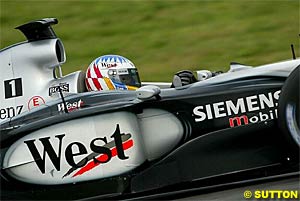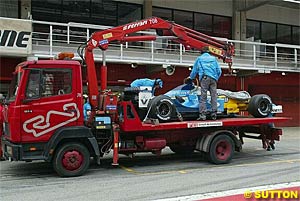
Atlas F1 Columnist
This week's Grapevine brings you |
There has been little made of Alexander Wurz' decision to remain at McLaren as a test driver, rather than continue trying out for a place at Jaguar. On the face of it, it appears that the Austrian, having discovered the calibre of the competition he was facing for a seat in the team, was unhappy to be asked for substantial financial backing to be brought to the table - or the terms on the contract were unacceptable.
Even then, things can get fairly complicated. A driver who brings speed, experience and cash can still find they are being offered a contract that opens them up to a number of disadvantages. Typically, new incumbents find they are disadvantaged in comparison with a previously installed teammate. This often takes the form of priority when considering who gets to trial or race new parts first, decide a development direction in the event of conflict, and define who the spare car is set up for.
Jaguar are supposed to be aiming for a top five finish in 2004, but budget cuts are making it tough to ensure that adequate development and testing is going to take place. A few million more from sponsorship would ease the burden considerably, but doing it through hiring a well sponsored driver carries risks of its own - particularly that they fail to deliver the goods, and the team's overall performance suffers as a result.
On the other hand, if there is anything that Jaguar has demonstrated in the past, it is that they have no qualms when it comes to promising drivers they will have a platform upon which to display their talents, but being ruthless if they are not delivering. Antonio Pizzonia was picked off the Williams test team, and came with an excellent reputation for speed. Give him a balanced car, and he will wring it's neck, lap after lap. Then again, thrown in at the deep in with Jaguar, he struggled to get the car set-up to his liking, so failed to get on the pace of Webber, and wasn't given a chance to see the season out. When Justin Wilson was hired to replace him, no substantive promises were made regarding a racing seat in 2004, but it was implied he had the chance to show his stuff, potentially earning the ride. That his car let him down more races than not is not really a factor in the Jaguar equation: unless he outperformed Webber, there was almost no chance he would match the team's criteria for their longer term number two driver.
It is interesting to see Jaguar being so positive about Klien's potential. Of course, they are not so crass as to admit the seat was bought, but few doubt this is the case. The youngster is clearly no slouch - his F3 performances prove he has plenty of talent - but the team are taking him on with the same public hopes that Williams put in to hiring Jenson Button. They could be right, but they are not taking chances.
When Wurz took off back to McLaren, he ensured his resigned contract would explicitly leave him permitted to take a race seat with another team. Jaguar are hedging their bets: if Klien fails to perform, Wurz has been asked to consider coming in as his replacement. The only tricky issue is a proviso in Red Bull contract that their sponsee completes half the season in order for Jaguar to claim all of their sponsorship moneys. Given Jaguar's history with their drivers, it does leave you wondering if Red Bull are going to be confused as to whether it was Klien, or themselves, who were taken for a ride by the marque, when they are looking back on 2004.
There has been some talk recently that Renault are expected to fall back in to the midfield next season, on the basis they have lost a number of key design personnel, and the new engine is sufficiently awkward to package that it negates most of the chassis and aerodynamic advantages the old unit.
It is immediately clear that the key to the season will be reliability. Working on the basic assumption that the car is probably going to be at least as quick as any other in the mid-field, before looking at race strategy, it is plain that every finish carries the potential for points. Should any of the front runners stumble, then there are even more points on offer, so finishes are vital. Indeed, at this early stage, Renault predict that any failure that prevents a driver from finishing will cost them, on average, two points.
Race strategy is a little less straightforward. The revised qualifying rules continue to reward reliability - a failure here would be catastrophic to race-day hopes - but the advantage of being able to run less fuel in qualifying is that it should bring a stronger position. But light fuel means early pitstops, where the heavier-fuelled competition would expect to make positions. Accordingly, it is an imperative that the engine is developed to conserve fuel, in order to minimise the penalty of a heavy fuel load. As an added bonus, this will make the engine more reliable.
The new engine might not offer all the advantages of the old, but it is expected to be both reliable, and moderately powerful: early estimates imply Renault are going to gain a dozen horsepower, whilst most of the competition are expected to struggle to reach what they ran in 2003.
With significant revisions made to the rear-end of the car to accommodate the new unit, Renault are less certain which circuits are likely to bring them the most joy. Whilst last season had them excel in places like Monaco, which rewards a good chassis, the new unit has a more powerful engine, and ought to be happy at the power circuits. Accordingly, they have eyes on Monza and Spa, as each requires a good engine, but also reward a decent chassis. If they can ensure the curb handling is as good as it was in 2003, then Imola will also feature high in the hopes of the team.
All in all, it seems that even though 2004 is being generally considered a holding year for the team, they consider their own prospects to be about as good as they were in 2003 - and that was a year to remember.
![]() Playing the Game
Playing the Game
 The price of a Jaguar seat alongside Mark Webber has been set at some nine million pounds - which is not a trivial sum to come up with: this is the money that is supposed to be being put up by Red Bull for Christian Klien. Clearly, any other driver making a claim on that seat has to demonstrate equivalent worth to the team, either by finding the capital to demonstrate it, or by consistently wringing an extra second out of the car. This is all part of the complex equation for budding racing drivers looking for a drive - if they don't have the talent, the funds, or a convenient mix of both, then they are overlooked.
The price of a Jaguar seat alongside Mark Webber has been set at some nine million pounds - which is not a trivial sum to come up with: this is the money that is supposed to be being put up by Red Bull for Christian Klien. Clearly, any other driver making a claim on that seat has to demonstrate equivalent worth to the team, either by finding the capital to demonstrate it, or by consistently wringing an extra second out of the car. This is all part of the complex equation for budding racing drivers looking for a drive - if they don't have the talent, the funds, or a convenient mix of both, then they are overlooked.
![]() Renault Shoot for Reliability
Renault Shoot for Reliability
 How much of an issue the packaging problems are remains to be seen - certainly the team are not advertising their solutions at the moment. But what they have done is take the time to consider the impact of their changes to their strategy for the forthcoming season, with a view to minimising the damage. The result of that work is interesting reading, even though it contains few surprises.
How much of an issue the packaging problems are remains to be seen - certainly the team are not advertising their solutions at the moment. But what they have done is take the time to consider the impact of their changes to their strategy for the forthcoming season, with a view to minimising the damage. The result of that work is interesting reading, even though it contains few surprises.
Please Contact Us for permission to republish this or any other material from Atlas F1.
|
Volume 9, Issue 49
Articles
In the Matter of da Matta
The French Revolution
Burning Rubber, Burning Oil
2004 Countdown: Facts & Stats
Columns
Rear View Mirror
Elsewhere in Racing
The Weekly Grapevine
> Homepage |